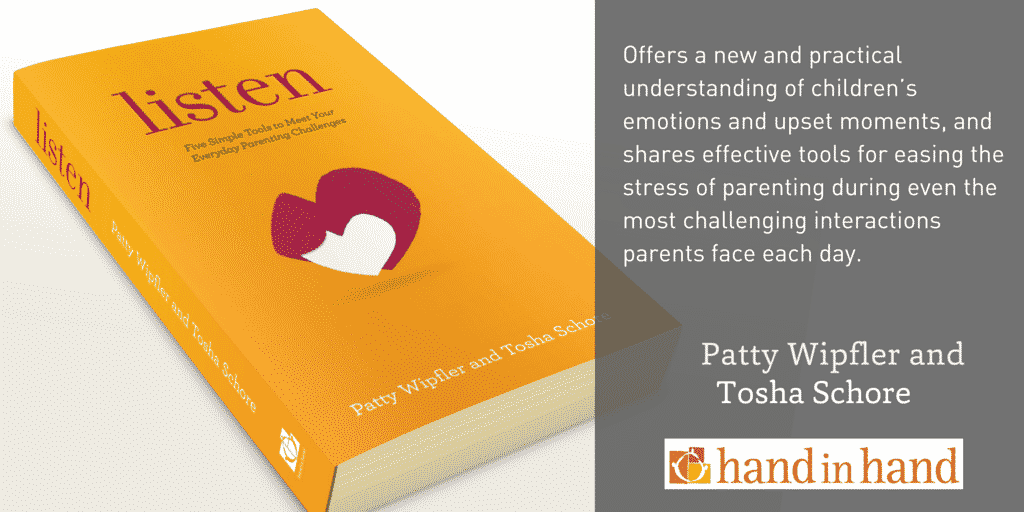Giggles and laughter are stress dissolvers, making play a great way to tackle many everyday parenting challenges.
In her book Listen: Five Tools To Meet Your Everyday Parenting Challenges, Patty Wipfler lists Playlistening as one of five essential parenting tools for calm, connected parenting. When parents use the Playlistening tool, they act goofy, promoting laughter and giggles, as their children lead the play. Parents are encouraged to put up resistance but ultimately let children win when they play fight, pillow throw or use play to test their strengths, allowing kids a moment to wield power over the adults in their lives.
Why does this work?
Play breeds an almost instant feelgood reaction that plumps up connections. Other times, play gives kids a chance to let go of pent up aggression. When kids act out they don't deliberately set out to upset parents or steamroll plans. Refusals like not eating, sleeping, getting dressed or brushing teeth, and rebuttals, tantrums and sibling fights arise when one or more of the children feel unsettled and don't have words to explain their feelings. The reason for an upset may not be immediately apparent, says Patty, or even understandable to parents. Rather than force an explanation, she suggests taking a detour using play. Laughter relieves the stresses, physical contact promotes further release and power play boosts connection. Kids can express away their issues without the need for words.
Play cannot magic fears away. If a game doesn't go down well, it might signal a need to spend time listening to a child cry – using a tool called Staylistening – which works to release deeply held fears, but when an invitation to play is followed by a smile (or a pillow to the head) go with it. Your day, and theirs, will run smoother.
Play Away your Parenting Struggles:
The Mock Slip, Trip or Fall Game
When to Play: Anytime the kids are getting cranky
How to Play: Pose a simple challenge: “Bet I can beat you down the hallway,” or “I need to catch you for a cuddle” and then start the race. As they take the lead and you give chase, have an ‘accident' where you slip, trip or fall. As you scrabble and sprawl, your kids will laugh (or tell you that you're crazy, or both!) and tensions slip away.
Why it Works: Not only do they ‘win' the challenge, they also see you looking silly and that gives them a boost of empowerment.
The ‘Take Your Parts' Game
When to Play: When there is resistance from your child like eating, taking meds or washing hair
How to Play: Step into the limelight and play your child's role in the battle. If she refuses medicine, suggest playing doctors and add a clean syringe to the supply box. Take the role of the patient and use playful prompts: “I hope she doesn't want to give me yucky medicine with that horrible syringe,” and then holler and play spit as she feeds it to you. If food is an issue try a nibble and say, “Eek! That does taste awful. How am I going to manage a plateful?” Parade this show of distaste and she may join you in a competition of disgusting sounds or faces.
Why it Works: Games like this give kids a sense of power over a situation they find scary, soothing their fears and sense of injustice.
 The Roughhousing Game(s)
The Roughhousing Game(s)
When to Play: When storms are brewing! These games help express anger and aggression
How to Play: Anything that takes some strength. You can pillow fight, swing her over your shoulder and have her try and get down, or challenge him to push you off the sofa and let him use his strength to make it happen. Suggest the play with a smile, put up a good fight, but remember to let them win.
Why it Works: Physical games like this build safety between you and are also a natural relaxant. Let your child's laughter be your guide. If she stops the play, check you are empowering not overpowering, and give her a second to get back in control. Then, let the good times continue to roll!
The ‘I Won't Go' Game
When to Play: Anytime your child is experiencing shyness or doubts around new people or places
How to Play: As you near your destination, you play shy. Run from the room with a little scream of terror and tell your child, “I'm scared. I don't want to go.” You can repeat this, moving slowly and then retreating, as she smiles or giggles. Sometimes, she will take your hand and lead you, other times you might ask for a helping hand.
Why it Works: Fears stop your child wanting to do new things. Your acting silly eases the tension and if they take the power role of guiding you to the new place that ups their confidence.
The Lion Tamer Game
When to Play: When he lashes out, growls or yells, “I hate you!”
How to Play: Act shocked and say something like, “It sounds like an angry lion got in here! How did that happen? He must need taming with kisses.” Attempt to ‘catch the lion' as he runs and you miss. If he hides, prompt him by asking for the lion to roar, and when you catch him shower him in light kisses and then see if he is ‘tamed.' If he continues to growl or grab try saying something like, “Oops, I got it wrong! Angry lions are tamed by kisses on the knees only,” or “Lions get tamed with raspberries on the belly.” Give him affectionate kisses or nuzzles until his laughter helps the anger subside.
Why it Works: You show him that you'll stick close by and stay loving even when he is at his scariest. This builds his reassurance and sense of safety.
Play requires your imagination and creativity, as well as your energy. If you are finding it hard to muster up what you need to play your own tensions could be riding high. Try getting some one-on-one support with a listening partnership. After a good talk, or even rant, you'll find play just as re-energizing as they do!
These games are from the book Listen, Five Tools to Meet Your Everyday Parenting Challenges. For more, buy the book.
From the Hand in Hand Toolbox:
- Enjoyed these games? Find more in 15 Playful Ways To Solve Sibling Rivalry
- Feeling stressed? Download this free guide 5 Revolutionary Ideas That Make Parenting Less Stressful

